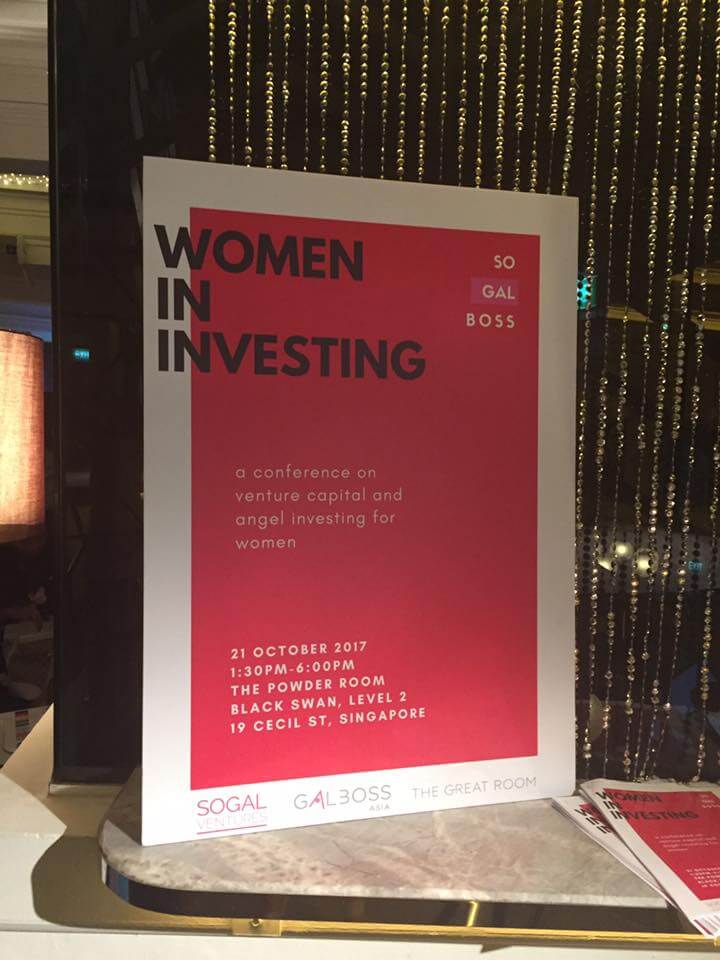How to be an Angel (Investor)
My mother was an angel. Earth angel. She saw to my aging grandparents when everyone else was working and she took care of my dad as he was dying of cancer and made our very small household budget stretch miraculously.
In all of this, she was a beautiful kind soul and never spoke ill of anyone. When her funeral came, all the enemies in the family managed to pay their respects on different days of the wake avoiding each other but showing up to honor one classy woman.
When my mother passed, I didn’t know where to focus my attention. My work while fulfilling me felt a little small now that I had more time on my hands. I used to be the main caregiver to my mother with the helper, I saw her to hospital visits and I was her companion when I could.
It was after slightly more than a year of soul searching and matching my talents and resources with the world of business, leadership, and economy that I saw the space I needed to fill in a very vivid dream. I woke up one day in November 2016, fully aligned in my body and mind. I lay in bed in Santa Monica daydreaming and future making like a caterpillar before being a butterfly. I called my best friend in Singapore to chronicle the day and the moment – I committed to being and playing a bigger game.
I am committed to helping create more Earth Angels (Investors). I would gather compassionate, kind, influential people who would use their wealth to invest in women ecosystem building startups and businesses. I was going to be an Angel Investor Educator and Angel Influencer.
Thank you, mom, for showing the way.
So…
10 Key Success Factors in Angel Investing
I was thrilled to meet fellow angel investors and investor wannabes at the SoGalBoss Summit. The speakers were the highest caliber with a mix of expertise and experience and a lot of compassion for the world we are building. These are my 10 takeaways. If you are intending to be an angel investor or are one already, I welcome you to send me questions and comments.
1. Invest only what you are afford to lose
99% of startups fail. 50% of businesses never make it past the first 5 years. If you intend to invest in any company you are not personally running you need to be aware that you have little or no control after you put your money in. The money either comes in 10x or 0x and some variation in between. The unicorns are not running wild and they are at this point still mostly paper money until sold. The mass media hype of a ton of money at 10-20x is rare.
So DON’T do it
Don’t die trying to be an Angel.
But if you know you can and want to be an Angel to a business because that is the mission you are aligned with and called to.
Do it wisely. Playfully and with real intent to add money and expertise to help the startup grow.
Have a Big Enough Why before you start. Examine your intentions before you begin.
2. Invest in what you use
All of the speakers suggested that we know what we are investing in. Pocket Sun of SoGal Ventures invests in the millennials generation and the She-Economy and her venture firm’s Investment Thesis is super clear.
When I asked about new technologies I am keen on and how I could not possibly wrap my head around the material fast enough, they agreed that my method of getting a trusted friend who is an expert in the area to look at the materials with me or quiz the founders was crucial before moving forward.
3. Invest in people
Repeatedly, everyone says to look closely at the executive team and to see that the team have worked with each other for some decent amount of time (2-3 years). If they are co-founders, check they compliment each other in their strengths.
By the way, founders must be a bit crazy. So be ready.
And since early stage is really the team and what they bring to the table
Are they obsessed with the startup? It has to be for posterity and it has to be their baby and if they want to get out – that’s a huge warning.
Do they really listen to you?
How do they manage teams conflicts?
How have they built a team?
Are they a single founder who can’t work with anyone?
Ask their employees and vendors who work with them for their 360-degree feedback.
Are they the creator/tech genius and not a good manager of people?
Remember innovation without implementation is just ideation
Or are they the business person with an idea and now looking for a team?
A talent magnet founder is a good aspect to have as people want to work for them
If they have too much to say and there is no money discussion. It is almost always a bad idea
Are they the Ideas, Sales or Execution? I am sure you can imagine that all 3 is ideal. Good luck finding that perfect founder. And when you do hold her down and invest.
Founder life sucks so they must have good reason to do it. Is it a passion project, mission or ego? Who are they really making it for? My psychological background has helped me greatly here. It is crucial before you bank on their dream project.
Trying to re-found a company is the most challenging. This means trying to remove a founder or get a new one. So to keep yourselves safe ensure that the vesting for founders is four years.
A Big Red Flags is a lack of regular communication. The best founders and CEOs give regular and detailed updates of the company’s progress. Michael suggested regular check-ins and that really helps the founders keep accountable as well. Is the entrepreneur going to be proactive with you even when it is a crisis or they are in a bad state. Transparency is crucial for true strategic partnership. Listening to what they tell and what they don’t tell you too.
How good is the founder and/or CEO at prioritizing? They do it every day
This is not what they put in a pitch deck so ask for it.
4. Invest in yourself and learning to know what you are measuring and seeing. Invest in a good lawyer and accountant. Don’t get hoodwinked by fancy pitch decks and moving promises. Do due diligence. On yourself and what you expect and can really expect. The balance of optimism and cynicism will keep you in check.
Most of the experts agreed that they take 1-3 months to do due diligence
and to “Think the Unthinkable”. An example of the Unthinkable raised was of Theranos https://www.vanityfair.com/news/2017/08/theranos-walgreens-settlement-running-out-of-cash. Where many people believe in the company which used a lot of borrowed credibility. If anyone did look closely in the investing stage, you would have seen even though the investors were credible and celebrities none were biotech investors. A warning sign.
Ask what could make this suddenly a 0x game
5. Please invest in things apart from startups
The ones you know and can measure returns. For myself, I have 3 properties 1 Singapore and 2 in Berlin, insurance, stocks and shares, my government savings for retirement and my own leadership development company. I am mostly covered.
I still prefer property investments however I am intrigued and also moved by innovation and mission-driven disruptions. Hence I am learning to be an angel.
But if you don’t feel safe or secure or clear about your investments. If you don’t know your risk appetite and don’t have a clear investment strategy with more conventional means of wealth creation. Look at those first.
Angels are not VCs. Remember that VCs spread risk across a large portfolio. They have to bank on a unicorn sometimes to cover their other investments which may be losses. VCs needs to return in 7-9 years. An angel can choose to invest in an eco-system builder, like a clinic for rare childhood illnesses, like a matchmaking app for nannies and mommies, etc. This means you can choose smaller investments and lesser returns. You don’t have to report to the investors in your fund. Maybe you have to report to your spouse or family but mostly you play a different game.
6. It may take you 5 to 7 years to really become a great investor. To internalize the spotting of a good deal and the ability to craft the deal to your benefit. Michael Lints from Golden Gate gave me great comfort when he said this. I was hesitant to even try and now I know the trying is the price of learning. Getting your hands dirty allows you to see clearly the investment and the challenges of each industry. Every investor and consultant in the room and founder shared horror stories of poor matches and losses and the need to remove founders and to buy out investors who weren’t aligned. Their scars were glorified as they survived to invest again and this time wiser and more prepared.
Educate yourself in round dynamics before you begin as angels and founders change their positions as rounds go and when VCs enter and renegotiate.
7. Network to get your best picks
Since you may be a new investor and not many inbound as yet. Inbound means startups sending their decks to you. You can start with proactively outbound reaching to startups which match your investor thesis. I have spent the last 2 and a half years at conferences in Singapore and United States spotting startups and founders I feel I would like to get to know and support. You don’t have to be physically at events as there are many platforms matching investors with founders or crowdfunding platforms and these allow you to see what is out there. Be comfortable cold calling and chasing a potential investment and if they are not ready for investing, at least you are on their mind when they next ask for funding.
I actually love being the unknown investor parading as a reporter (so now my cover is blown). As then I can really see the startup on their downtime and not always pitching (although they really should) and ask probing questions which look a lot like these 10 areas of consideration. Apart from the usual business case and the market validity.
Eventually, you hope to be getting inbound and on the top 5 of a founders list which matches your investment thesis.
8. Pay to learn. Learn so you don’t have to over-pay
Pocket suggested rather than put the usual $50,000 into one startup, try to convince 10 startups to take $5,000 as your investment and that will allow you to pay to learn. This will allow you to learn about negotiations in ten different companies.
Elaine Kim, CRIB co-founder, and CEO, suggested that we may need to buy the ticket to get into the game but a small ticket with the possibility to top up.
What you could use to convince them to take $5000 rather than the usual
$50 000 includes your help with getting them an executive team, clients, selling products, be their mentoring sounding board, raise money and open doors to other investors.
9. Form your own Proprietary Insights
This came from Lee Xueling from Bain and Company, I resonated strongly with; who emphasized that we should form our own proprietary insights. Test their product and process and look at their competition current and new innovations that could dethrone them.
She mentioned how notebooks growth were totally knocked off by the introduction of the Ipad. These unexpected and unpredicted are normal in an era of constant disruption.
You cannot manage what you cannot measure. Xueling reminded us to be careful what people say and do. Surveys aren’t true. Try to do a follow home exercise, where you follow the consumer back to see how exactly they use the product. Intuit does that.
Watch the Net Promotion Score and it has to be at 9-10. Or else that’s a warning sign too.
Enjoy startup post-mortems and learn from them
And consider what if a big company takes over the vertical?
10. Make your own Investment Thesis.
SoGal Ventures has a clear investment thesis that makes founders know immediately if they are a match and their thesis is so clear that other investors pass them introductions when they see a good company.
What makes a good thesis?
- Differentiated
- Helps filter out 90% of deals
- Reflect your own World View & Strengths
- Catching on Big Challenges
- Helps you build a Legacy
- Essential Elements
- Stage
- Sector Focus
- Geography Focus
- Check Size
- Deal Frequency
- How Involved
- (and add anything else you need for you to match your investor appetite)
- Things to remember
- Always Test the Thesis
For your partners and you, it is like a marriage. You could work with partners for ten to twenty years. So pick your first few investments very carefully
For Early Stage Startups, it is very hard to check everything because they don’t have the data. So it has to be something you believe in. And yes your Gut feeling
and at least 61% of everything you want.
Finally, I think Sarah Chen, CVC at Sime Darby was the one who reminded us that investing in a company is a privilege. It is their blood, sweat, and tears and they are trusting you to give good advice.
I could not help myself – the SoGalBoss Summit was so good, I sacrificed my Sunday to write this. I loved how committed clear and conscious the speakers were. Thanks again. Pocket and Sabrina and all else who started this off.
The next SoGalBoss Summit in January will focus on women in entrepreneurship, with the same information-packed, no-bullshit approach but different topics.





























